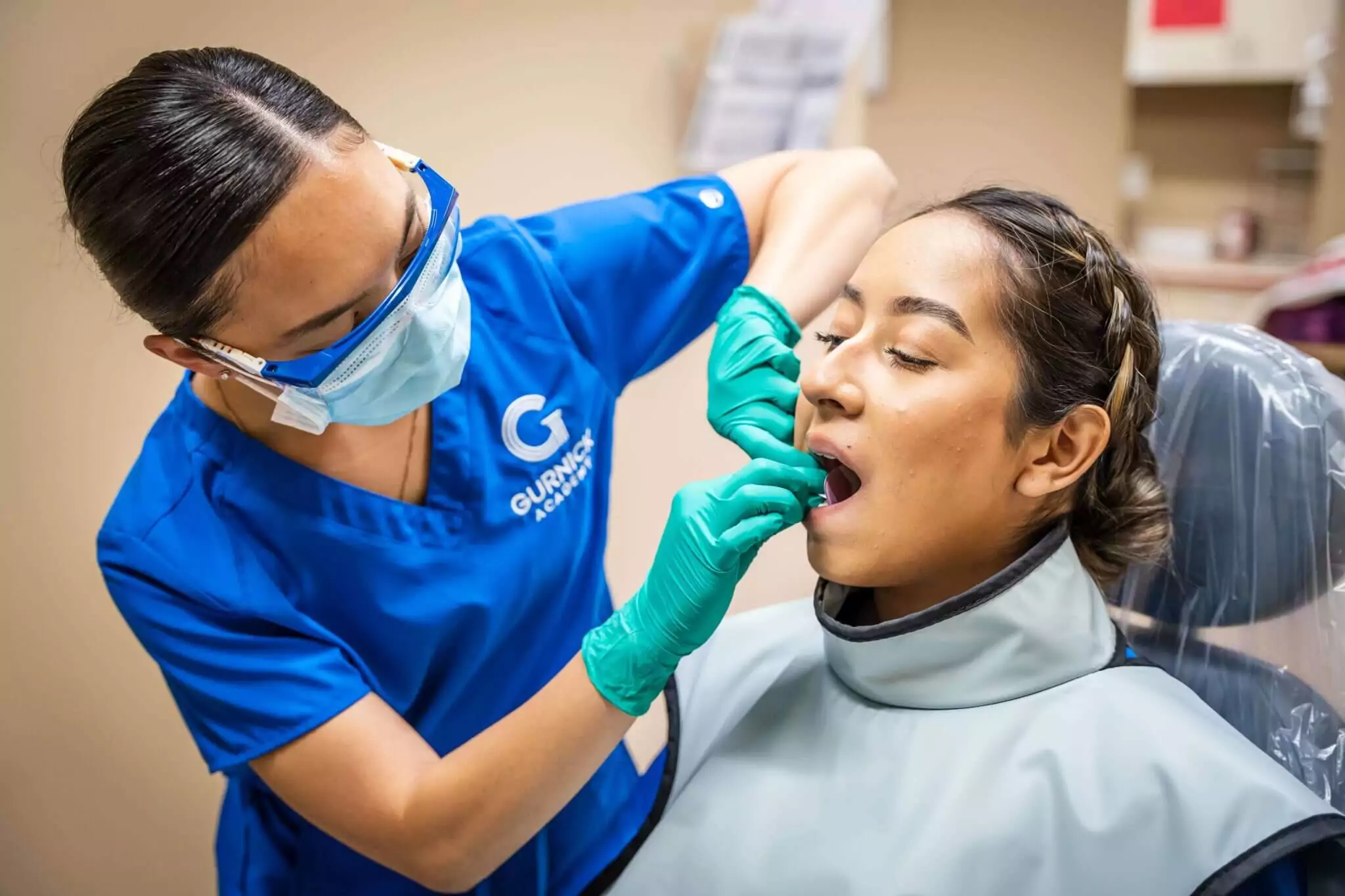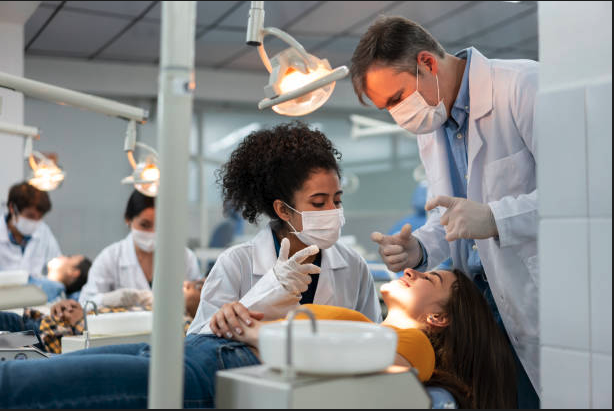Table of contents
Get Started with Kwikly
Get the latest updates, insights, and exclusive content delivered straight to your inbox.
Who This Is For
- Students or recent graduates curious about what degrees and training are needed to start a dental hygiene career.
- Career changers exploring dental hygiene as a new path in healthcare.
- Working dental assistants considering further education to advance their careers.
- Anyone interested in dental hygiene who wants to understand the educational paths, licensing steps, and long-term opportunities in the field.
Key Takeaways
- If you’re thinking about becoming a dental hygienist, you’ll typically need at least an associate degree from an accredited program, but there are more options if you want to level up your career.
- You’ll get hands-on experience through internships and supervised practice - it’s a big part of your education and makes sure you’re ready to work with real patients.
- The job outlook’s looking pretty good for dental hygienists, with 7% employment growth projected and a median salary of $94,260 as of May 2024. Dental hygienists often earn above average salaries compared to other professions, according to industry benchmarks.
Yeah, if you're wondering whether you need to go to school to be a dental hygienist, the short answer is yes. You'll usually need at least an associate degree from an accredited program. We're gonna break down all your educational options, the steps to get licensed, and what you can expect on your journey to becoming a dental hygienist.
Introduction to Dental Hygiene
Dental hygiene is a cornerstone of the healthcare industry, dedicated to preventing and treating oral diseases that can impact a person’s overall health. Dental hygienists are essential members of the dental care team, working closely with dentists and other professionals to help patients maintain optimal oral health. If you want to become a dental hygienist, you’ll need to complete an accredited dental hygiene program, which typically leads to an associate’s degree or bachelor’s degree. These programs are designed to prepare students for the licensure process and cover a wide range of topics, including oral pathology, radiography, and patient assessment. By focusing on both the science and practice of dental hygiene, these programs ensure graduates are ready to provide high-quality care and play a vital role in promoting oral health within their communities.
Educational Requirements for Dental Hygienists
The path to becoming a dental hygienist involves completing specific educational and licensing steps, including academic coursework, clinical training, and passing required exams.
So you want to start a career as a dental hygienist? You’re gonna need to follow a specific path. The minimum you’ll need is an associate degree in dental hygiene, though you can go further with bachelor’s and master’s degrees if you want more opportunities. These programs are designed to give you everything you need to succeed in the dental world.
Before you can even get started, you’ll need to complete prerequisites. That means having your high school diploma or equivalent and completing coursework in biology, chemistry, and math. You’ll also need solid academic skills in reading, writing, math, and science to make it through dental hygiene school.
To get licensed, you’ve gotta graduate from an accredited dental hygiene program. These programs typically cover general education, biomedical sciences, dental sciences, and dental hygiene sciences. You’ll also need to pass the National Board Dental Hygiene Examination and state-specific clinical and law exams.

Associate Degree in Dental Hygiene
Most people who want to become dental hygienists start with an associate degree in dental hygiene. Here’s what these programs look like:
- You’ll usually find them at community colleges or technical schools
- They take about two years to finish
- They give you the foundation you need for entry-level jobs
- You’ll take courses in dental hygiene, general education, biomedical sciences, and dental sciences
- You’re looking at around 76-78 credit hours
You’ll be in classes four to five days a week, getting hands-on experience in clinical settings at dental schools. This training gets you ready for all kinds of roles in dental offices, including teaching patients, managing pain, and providing clinical services.
When you graduate, you’ll be ready to take your licensing exams and start working as a licensed dental hygienist.
Accreditation and Licensure
Accreditation makes sure dental hygiene programs meet high standards and put patient safety first. The Commission on Dental Accreditation (CODA) handles accrediting dental hygiene programs, giving them a stamp of approval that shows they’re quality programs that meet industry standards, as recognized by the American Dental Association.
To get licensed, you need to:
- Graduate from an accredited dental hygiene program.
- Pass the National Board Dental Hygiene Examination, which is administered by the Joint Commission to ensure national standards for competency.
- Meet licensing requirements by passing state-specific clinical and law exams.
This process is pretty rigorous, but it ensures that after completing these steps, you are qualified to become a licensed hygienist ready to provide safe and effective oral health care.
Types of Dental Hygiene Programs
If you’re looking to become a dental hygienist, you’ve got several educational paths to choose from, each with its own benefits and opportunities. Many programs are available to suit different interests and career goals. Dental hygiene programs give you the education and training you need for a successful career in the dental field. These programs usually include general education courses along with specific dental hygiene courses.
From community colleges to bachelor’s and master’s degree programs, there are options for different career goals and educational needs.
Community Colleges
Community colleges offer affordable and flexible dental hygiene programs that work for a lot of students. These programs often have flexible scheduling, so it's easier to balance school with everything else you've got going on. You'll need to complete prerequisite courses with a minimum grade before you can enroll in the dental hygiene program.
Community college programs give you a solid foundation in dental hygiene and prepare you for entry-level positions and further education if you want it.
Bachelor's Degree Programs
Bachelor's degree programs in dental hygiene usually take four years and give you a more comprehensive education compared to associate degree programs. These programs often include courses in:
- Public health
- Preventive care
- Liberal arts
- Leadership skills, giving you a well-rounded education.
If you already have an associate degree, degree-completion programs can be finished in as little as 15-18 months. Some bachelor's degree programs can even be completed entirely online, which is great if you're working.
Master's Degree Opportunities
Master's degree programs in dental hygiene are perfect if you want specialized knowledge and leadership opportunities in the field. These programs focus on advanced clinical practices and developing leadership skills, preparing you for careers in teaching, research, and administrative roles.
If you get a master's degree in dental hygiene, you can go for advanced roles like specialists in oral disease prevention or community program directors, which really boost your career prospects.
Online Dental Hygiene Education
Online dental hygiene education gives you a flexible alternative to traditional classroom learning, which is great if you're busy. These programs can help you get a bachelor's degree, which you'll often need for further academic pursuits and career advancement.
Getting a bachelor's degree in dental hygiene online can lead to advanced roles or specializations, significantly boosting your career prospects. Online programs are getting popular with people who need to balance education with work and family.

Hybrid Programs
Hybrid dental hygiene programs mix online classes with in-person clinical training, giving you flexibility. These programs usually require you to attend some in-person classes while you complete the rest of your coursework online.
The blend of online coursework and mandatory in-person clinical training makes sure you develop practical skills while enjoying the convenience of online education.
Fully Online Degree-Completion Programs
If you're already a licensed dental hygienist, you can boost your qualifications by earning a bachelor's degree entirely online through degree-completion programs. These programs let you transfer credits from your previous associate degree coursework, making it easier to finish your bachelor's degree.
Fully online degree-completion programs often include interactive online courses to help you learn, giving you detailed information for a comprehensive and flexible educational experience.
Clinical Experience and Hands-On Training
Clinical experience and hands-on training are huge parts of dental hygiene education. These practical experiences let you apply what you’ve learned in real-world scenarios, making sure you’re ready for patient care.
Practical training helps you gain confidence and develop the manual skills you’ll need, getting you ready for the daily responsibilities of a dental hygienist. In dental hygiene programs, you’ll often be placed in modern dental clinics to get hands-on experience under the guidance of experienced instructors.
Compared to a dental assistant, dental hygienists receive more advanced clinical training, which includes additional skills and responsibilities such as patient assessment, preventive care, and specialized procedures that require specific certification.
Supervised Clinical Practice
Supervised clinical practice means you'll work directly with patients under instructor guidance, and it's a crucial part of dental hygiene education. These experiences usually happen in modern dental clinics, giving you the chance to apply your skills in a real-world setting.
Hybrid dental hygiene programs require you to complete both online coursework and in-person clinical components, making sure you get a well-rounded education.
Internships and Externships
Internships and externships are vital for dental hygiene students, helping you transition from classroom learning to real-world practice. These experiences give you the chance to work directly in clinical settings, reinforcing what you've learned with practical application.
Internships and externships help you develop essential skills like patient interaction, time management, and proficiency in various dental hygiene procedures.
Licensing Process for Dental Hygienists
The licensing process for dental hygienists makes sure practitioners are ready to provide high-quality dental care. The National Board Dental Hygiene Examination (NBDHE) is a crucial step for licensure, testing your knowledge and skills through 350 multiple-choice questions.
Besides the NBDHE, many states require dental hygienists to pass state-specific clinical and law exams to show you’ve got the practical skills required for licensure. Once you pass these exams, you can apply for licensure through your state dental board, making sure you meet all the requirements. Passing all required exams allows you to become a registered dental hygienist (RDH).

National Board Exam
The National Board Dental Hygiene Examination is a critical part of the licensing process for dental hygienists. This exam tests both your theoretical knowledge and practical skills that are essential for dental hygiene practice, making sure you're ready for your role.
Passing the NBDHE shows you're competent and is required for licensure in dental hygiene, making it a must for all aspiring dental hygienists.
State-Specific Exams
Besides the NBDHE, many states require dental hygienists to pass state-specific exams for dental hygiene licensure. These exams often include a jurisprudence exam that tests your knowledge of dental laws and regulations, making sure you understand the legal aspects of your profession.
Skills and Qualities of Successful Dental Hygienists
Successful dental hygienists bring a unique blend of technical expertise and personal qualities to their work. Manual dexterity is crucial, as dental hygienists perform precise procedures in small spaces. Attention to detail helps them spot early signs of oral health issues, while effective communication skills allow them to educate patients and work well with the dental team. Critical thinking and problem-solving abilities are essential for assessing patients’ oral health and developing tailored care plans. Dental hygienists also need to be compassionate and able to manage patient anxiety, creating a comfortable environment for everyone. Staying current with advances in dental hygiene and committing to ongoing professional development are key traits of top-performing dental hygienists.
Continuing Education and Professional Development
Continuing education helps dental hygienists keep their skills updated and meet licensure requirements. Ongoing education boosts dental hygienists' knowledge, skills, and professional practice, making sure they provide the best care possible.
You can pursue additional training in areas like education, business administration, marketing, and public health, leading to specialized roles and better earning potential.
License Renewal
To renew your license, you'll typically need to pay fees and complete continuing education hours. License renewal usually happens every 1–3 years, with dental hygienists required to complete 10 to 20 continuing education hours per year, up to 60 hours over three years.
Continuing education topics commonly include CPR and infection control, making sure dental hygienists stay knowledgeable about essential practices.
Advanced Certifications
Advanced certifications can lead to specialized roles and better earning potential in dental hygiene. Certifications in areas like dental anesthesia or periodontics can boost your professional standing, showing specialized expertise.
Certifications like the Oncology Certificate for RDHs focus on specific areas like cancer care, improving patient outcomes and enhancing your career prospects.
Career Opportunities for Dental Hygienists
You can pursue a wide range of career opportunities as a dental hygienist, from clinical roles in private dental offices to positions in public health and advanced specializations. The skills and knowledge from your dental hygiene education prepare you for diverse roles within the dental industry. The work environment for dental hygienists is varied, including dental offices, public health clinics, hospitals, and nursing homes, offering opportunities to work in different healthcare settings.
Working as a dental hygienist is really rewarding because of the positive impact you have on patients’ oral health and overall well-being. Dental hygienists work in a variety of settings and often benefit from flexible schedules. Your career opportunities aren’t limited to clinical settings; you can also pursue corporate positions, public health roles, research, and education.
Successful dental hygienists often find fulfillment in directly contributing to patients’ oral hygiene and educating them about maintaining good oral health practices to prevent gum disease and oral diseases. Daily responsibilities may include scheduling appointments and collecting patients' medical history to ensure comprehensive care.
Working in Private Dental Offices
A common career path for dental hygienists is working in private dental offices. In these settings, you'll perform procedures like cavity removals, cleanings, and patient education about oral hygiene.
Externships during dental hygiene programs let you experience real work environments outside your training institutions, boosting your adaptability and practical skills. Dental hygienists in private offices often work part-time, allowing for a flexible work-life balance.
Public Health and Community Clinics
In public health settings, you'll focus on providing dental care to underserved communities. These roles often involve working in community clinics, improving access to dental care, and focusing on preventive care to enhance overall health.
In public health positions, you'll suggest treatments based on patient needs during appointments, contributing significantly to the community's oral health. These roles are crucial in bridging the gap in dental care access and improving the quality of life for many people.
Specializations and Advanced Roles
You can specialize in various areas as a dental hygienist, focusing on specific aspects of dental care. Specializations like the Oral Systemic Educator Certificate and Community Dental Health Coordinator Certificate provide advanced training and career advancement.
Advanced roles for dental hygienists include:
- Clinical director
- Program director
- Research roles
- Leadership roles in public health
These positions often require additional training and leadership skills, offering career growth and higher earning potential.
Challenges and Rewards of a Dental Hygiene Career
A career as a dental hygienist offers both challenges and significant rewards. On the challenging side, the job can be physically demanding, often requiring long hours on your feet and performing repetitive tasks. Dental hygienists may also encounter patients who are anxious or fearful, which calls for empathy and strong pain management skills. Despite these challenges, the rewards are substantial. Dental hygienists have the opportunity to make a real difference in patients’ lives by helping them maintain good oral hygiene and prevent oral diseases, which contributes to their overall health. The job outlook for dental hygienists is also very positive, with the Bureau of Labor Statistics highlighting strong demand and growth in the field. For many, the satisfaction of improving patients’ well-being and the stability of the profession make dental hygiene a highly rewarding career choice.

Job Outlook and Salary Expectations
The job outlook for dental hygienists is promising, with projected employment growth that’s way faster than the average for all occupations. The Bureau of Labor Statistics projects a 7% growth in employment for dental hygienists from 2024 to 2034, driven by increasing demand for dental services and preventive care. However, if you're considering working on a dental staffing marketplace, it's important to be aware of the potential risks and costs associated with this employment path.
You can expect about 15,300 job openings for dental hygienists annually due to job growth and the need to replace workers. Many of these openings occur as current dental hygienists transition to different occupations or retire. The dental hygienist's salary is competitive compared to related dental careers, with earnings influenced by factors such as geographic location, experience, and work setting. This positive job outlook makes dental hygiene an attractive career choice if you’re interested in the healthcare industry.
For those beginning their job search as aspiring dental hygienists, networking, tailoring your resume, and exploring various opportunities can help you secure a position in this growing field.
Employment Growth
The Bureau of Labor Statistics' Occupational Outlook Handbook highlights the favorable job outlook for dental hygienists. The projected 7% growth in employment reflects the increasing recognition of the importance of oral health and preventive care.
This growth translates to about 15,300 average annual openings for dental hygienists, providing plenty of opportunities for new graduates and experienced professionals alike. Factors contributing to this growth include an aging population, increased awareness of oral health, and advancements in dental technology.
Salary Range
Your salary as a dental hygienist will vary based on your education level, experience, and work setting. The median annual dental hygienist's salary was reported to be $94,260. This data was recorded in May 2024.
Higher salaries are often tied to specialized roles, advanced degrees, and positions in high-demand areas. Understanding what influences salary differences helps you make informed decisions about your career path and potential earnings.
Comparison to Other Professions in Dental Care
Dental hygienists play a distinct and vital role within the dental care team. While dental assistants often handle administrative duties and provide support during procedures, dental hygienists are responsible for direct patient care, such as performing cleanings, conducting oral health assessments, and educating patients about oral hygiene. Becoming a dental hygienist requires completing a specialized dental hygiene program, usually resulting in an associate’s or bachelor’s degree, which involves more advanced training than what’s required for dental assistants. This higher level of education allows dental hygienists to take on greater responsibilities and provide a broader range of services. For those passionate about oral health and patient care, the dental hygienist role offers a unique blend of hands-on clinical work and meaningful patient interaction.
Similar Occupations to Dental Hygienists
If you’re interested in oral health but want to explore different career paths, there are several occupations similar to dental hygienists. Dental assistants work closely with both dentists and dental hygienists, helping prepare patients for procedures, maintaining records, and handling various administrative tasks. Dental therapists provide primary dental care, including exams, cleanings, and basic restorative treatments, often focusing on underserved populations. Occupational therapists, while not limited to dental care, sometimes help patients develop habits and skills that support good oral health and overall well-being. Each of these roles requires different training and education, but all contribute to improving patients’ health and quality of life in their own way.
Summary
So here's the deal - becoming a dental hygienist involves a well-defined educational path, including associate, bachelor's, and master's degree programs, each offering unique benefits and opportunities. The licensing process makes sure dental hygienists are ready to provide high-quality care. Continuing education and professional development play crucial roles in maintaining your skills and advancing your career. With diverse career opportunities, promising job growth, and competitive salaries, dental hygiene is a rewarding and impactful career choice. Consider taking the next step towards becoming a dental hygienist and making a difference in the world of oral health.
Frequently Asked Questions
Do you need a degree to become a dental hygienist?
Yeah, to become a dental hygienist, you typically need at least an associate degree in dental hygiene. This educational requirement is essential for starting your career in the field.
What is the role of accreditation in dental hygiene programs?
Accreditation is crucial because it makes sure dental hygiene programs meet high educational standards and focus on patient safety, making graduation from such programs essential for licensure.
Can you complete a dental hygiene degree online?
Yes, you can complete a dental hygiene degree online, as many online and hybrid programs are available, especially for licensed dental hygienists looking for degree-completion options.
What is the National Board Dental Hygiene Examination?
The National Board Dental Hygiene Examination (NBDHE) is essential for licensure, testing your knowledge and skills necessary for effective dental hygiene practice. Passing this exam is a key step in becoming a licensed dental hygienist.
What are the job prospects for dental hygienists?
Job prospects for dental hygienists are looking good, with a projected 7% growth in employment from 2024 to 2034, leading to about 15,300 job openings each year. This growth reflects both increasing demand and the need to replace retiring workers, as well as changes in dental employment.








